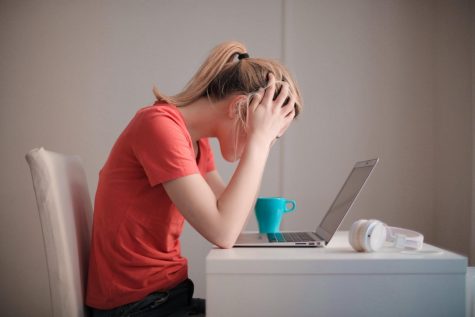How to Relieve BLS’s Online Mental Health Crisis

As the U.S. approaches month eight of the COVID-19 pandemic, students across the country are struggling to care for their mental health.
Social distancing and the statewide lockdown have had devastating consequences for many, fostering an atmosphere of increased isolation and loneliness. It has also upended the lives of many students and their families, creating exacerbating concerns, such as food insecurity and financial strain, which makes it difficult for students to focus on their wellbeing. Amid these crises, the Boston Latin School community must do more to care for their student body’s mental health.
Some students report having a hard time adjusting to remote learning or feeling disconnected because of the lack of in-person interaction with their classmates and friends. “Since I became a senior this year, I have [had] to take on the college application process this fall, which is already a stressful time on its own and COVID[-19] can make this time even more stressful in many ways. Since we’re not in school, it’s hard to feel the in-person support seniors would usually get from teachers and staff. Losing that in-person support can make this process more difficult and stressful than it already is,” Spoorthi Channappa (I) expresses.
Many students at BLS have also described a loss of motivation in this virtual setting. Academic burnout has been a struggle for many, as Sanjana Singh (II) puts: “Because there is no real division between school, homework and the rest of the day, it feels like never-ending work stretching straight through the weekend and on a loop. This has made it difficult to stay focused and not burn out.”
This school year was intended to be as rigorous as a regular school year, but this unrealistic mindset makes it extremely difficult to accommodate the needs of students. Maintaining good mental health is key to productivity, as symptoms of poor mental health such as lethargy, fatigue, anxiety, difficulty concentrating and feelings of sadness can crowd out constructive school performance.
Ms. Sylvester, a BLS guidance counselor, says, “It is difficult for students to produce their best when they are not feeling their best. A drop in work production and absenteeism signal that there may be an underlying problem, however, it is important to look beyond the surface and shift the conversation from academics to emotional health.”
In a school where the rate of mental health issues are troublingly higher than the rest of the school district even prior to COVID-19, we need to implement clear and decisive solutions. We have an active guidance office and the BLS community should learn to use it to the fullest extent.
Unfortunately, however, there are mental and physical obstacles, as Thomas White (I) points out, “When you’re struggling with issues, the last thing you want to do is sign up for a Zoom call with someone you have probably never met before. Teachers and administrators have a tougher time of just seeing physical cues of discomfort or instability within a student, and we all have been at home for the last eight months, which has only exacerbated any issues at a student’s home.”
This is evidently a hard problem to tackle, but there are still options for confronting it. We can establish a strong line of communication between teachers and guidance counselors, and offer training in identifying cues of emotional distress and discomfort within students so that staff can be more capable of accommodating these issues as they arise.
In addition, now that BLS uses extended homeroom as a time for meaningful discussions, we can facilitate discourse on mental health. Stigma surrounding mental health is instigated in a vicious cycle that continues in the absence of open discussion.
Overcoming internal barriers that hinder people from seeking external support is a step in the right direction to fostering a safer community. Now, more than ever, we have to be implementing every possible solution in order to make these uncertain times easier for all BLS students.






